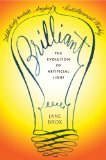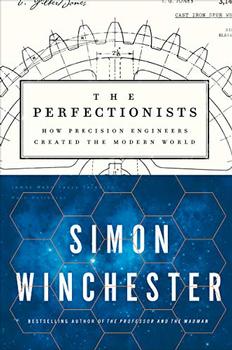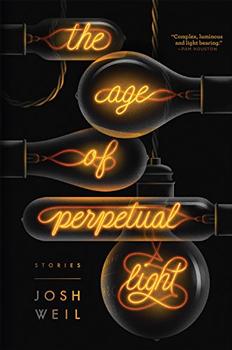Summary | Excerpt | Reviews | Beyond the book | Read-Alikes | Genres & Themes | Author Bio

The Evolution of Artificial Light
by Jane BroxBrilliant offers a sweeping view of a surprisingly revealing aspect of human history--from the stone lamps of the Pleistocene to the LEDs embedded in fabrics of the future.
Brilliant, reminiscent of Lewis Hyde’s The Gift in its reach and of Timothy Egan’s The Worst Hard Time in its haunting evocation of human lives, offers a sweeping view of a surprisingly revealing aspect of human history - from the stone lamps of the Pleistocene to the LEDs embedded in fabrics of the future.
Brox plumbs the class implications of light - who had it, who didn't - through the many centuries when crude lamps and tallow candles constricted waking hours. She convincingly portrays the hell-bent pursuit of whale oil as the first time the human desire for light thrust us toward an environmental tipping point. Only decades later, gas street lights opened up the evening hours to leisure, which changed the ways we live and sleep and the world’s ecosystems.
Edison’s "tiny strip of paper that a breath would blow away" produced a light that seemed to its users all but divorced from human effort or cost. And yet, as Brox's informative and hair-raising portrait of our current grid system shows, the cost is ever with us.
Brilliant is infused with human voices, startling insights, and, only a few years before it becomes illegal to sell most incandescent light bulbs in the United States, timely questions about how our future lives will be shaped by light.
Brilliant is more than an eloquent and gorgeous history of artificial light; it is a survey of profound experiences long lost to the human senses, imagination and heart. Brox reveals how light and darkness create intimacy and isolation, mark periods of rest, work and dreaming, and she demonstrates how light divorces us from and damages the natural world. All students of literature, history and art should read Brilliant; anyone interested in what it means to be human should read it, too...continued
Full Review
(668 words)
This review is available to non-members for a limited time. For full access,
become a member today.
(Reviewed by Jo Perry).
Brilliant provokes much thought on a variety of topics: circadian rhythms; the health dangers of light exposure; the depiction of natural and man-made light in art (Brox discusses three of Van Gogh's night paintings and explains what light and darkness was like for him.); the Columbian Exhibition; the eccentric and visionary Nikola Tesla; the effect of light on the lives of women; etc. I leave it to each reader to explore those topics that interest him most.
Brilliant illuminated a favorite poem of mine, Coleridge's Frost at Midnight, in which the speaker describes a flame as "companionable," "unquiet," "a fluttering stranger" whose restless and mysterious movements exhibit a human sympathy. Post Brilliant, Coleridge's ...
This "beyond the book" feature is available to non-members for a limited time. Join today for full access.

If you liked Brilliant, try these:

by Simon Winchester
Published 2019
The revered New York Times bestselling author traces the development of technology from the Industrial Age to the Digital Age to explore the single component crucial to advancement - precision - in a superb history that is both an homage and a warning for our future.

by Josh Weil
Published 2018
A dazzling new work that spans a century and eight tales of light, human progress, and the search for a better life from Josh Weil, one of "the most gifted writers of his generation" (Colum McCann), winner of the Sue Kaufman Prize from the American Academy of Arts and Letters
Believe those who are seeking the truth. Doubt those who find it.
Click Here to find out who said this, as well as discovering other famous literary quotes!